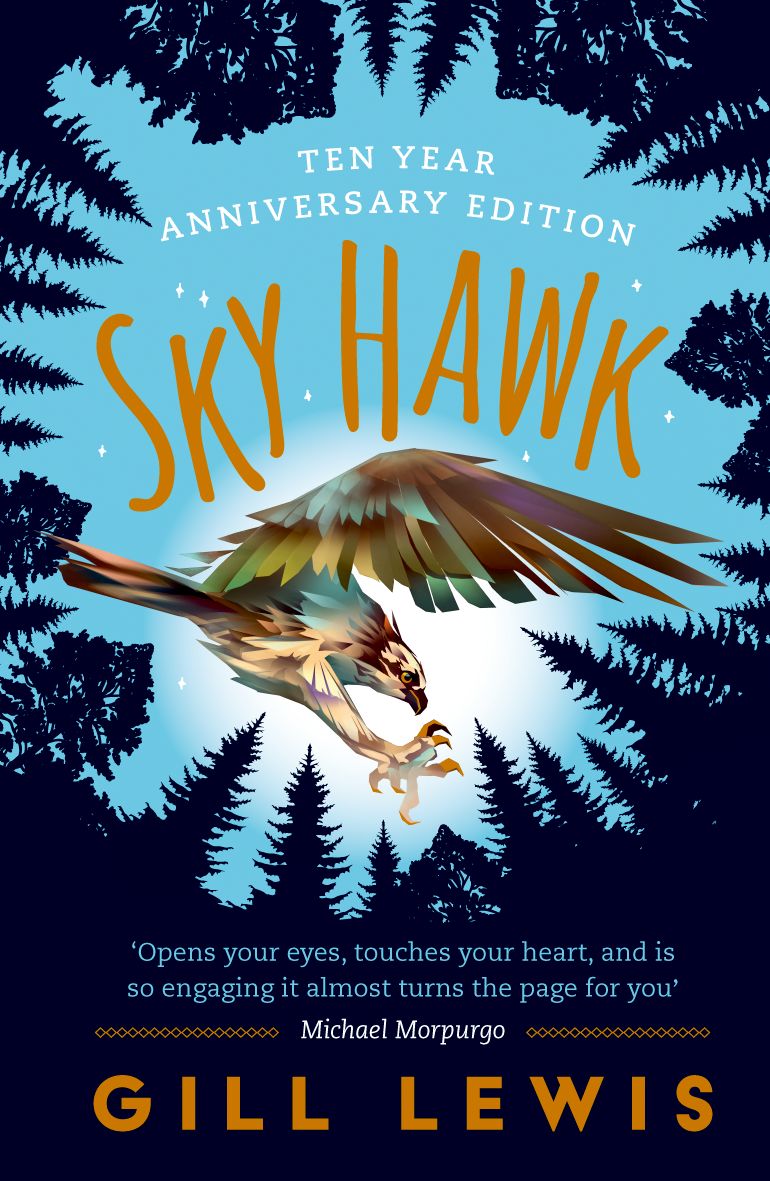
This article is in the Category
Wild Books: Catalysts of Change
Just over ten years ago, as an unpublished author, I tentatively sent out my newly finished manuscript, Sky Hawk. I had high hopes and dreams for it. It remains a story very close to my heart. I chose to write about the osprey because it is a symbol of hope and success. The osprey was persecuted to extinction in the UK, and only through the efforts of dedicated organisations and individuals working together, has the osprey begun to thrive again and secure its future.
However, at first, my manuscript Sky Hawk, was met with rejection. One literary agent said she loved the story but couldn’t see a place for it. She said that children simply weren’t interested in nature stories anymore. I remember feeling devastated, not only for the rejection but if it were true, that children really had lost interest in nature, then what hope was there? How could children want to protect something they had little care for? This seemed borne out by leading research into the words used in children’s language. Slowly, words like bluebell, acorn and otter had been slipping away.
In 2011, Sky Hawk was published into a world that I was told had turned its back on nature. I thank my agent, editor and publisher for daring to take the chance on it. But it feels there has been a major shift in awareness over the last ten years, at the urgency of the changes we need to see. Young people across the world have risen up to demand that governments tackle the biodiversity and climate crisis.
Books are a fundamental part of this much needed change. We are a social species, seeking ways to share information and stories. Our ability to communicate and collaborate is essential to our survival. Books stimulate curiosity and raise awareness. They excite us and take us on journeys, making us question the world around us. The phenomenal success of The Lost Words by Jackie Morris and Robert Macfarlane brought the wild world into classrooms, hospitals and care homes. The Promise by Nicola Davies has planted the seeds of change in children’s minds. There are wonderful non-fiction books by authors such as Jess French and Yuval Zommer. Authors Lauren St John, Nizrana Farook and Piers Torday take us on wild adventures, while Sita Brahmachari, Julia Green and Nicola Penfold dare us to imagine potential futures if we do not change our ways. Dara McAnulty’s remarkable Diary of a Young Naturalist allows insight into the powerful connection we have with nature and gives us permission to share our love for it.
However, authors and illustrators do not have the power to make changes alone. Just like saving the osprey, ensuring that books about the wild world reach the hands of readers, will take a huge collective effort from dedicated individuals and organisations working together. Publishers need to be brave and dare to publish radical books. The extraordinary ongoing support from librarians, teachers, parents, booksellers, bloggers and reviewers is fundamental to engaging children with literature that can embed a deep love and respect for our shared Earth.
Sky Hawk has its ten-year anniversary this year, and I’m hugely proud that the story is still being widely read and enjoyed. I have been emailed by readers who have said their own path through conservation studies at university were initiated by reading the book. Sky Hawk started me on a personal writing journey, helping me to find my own voice. In the past ten years I have written about raptor persecution in the UK, the effects of trawling and overfishing, coltan mining in the Democratic Republic of Congo and the importance of rewilding cities.
The United Nations has just declared the next ten years as the decade of global nature restoration. We need to rewild not only the world, but ourselves too. Books will help do this through empowering the next generation with knowledge, and rewilding hearts and minds. When we allow change to happen, it can come far more quickly than we can possibly imagine. When Sky Hawk was first published, I never dreamed of seeing ospreys fishing near my home in Somerset. But now ospreys are regular visitors at Poole Harbour.
We have a world awakening to what we stand to lose if we do not address the biodiversity and climate emergency. Books are catalysts of change. And we can be the agents of change, but we can only make great change happen, if we do it together.
 Gill Lewis is a multi-award winning children’s author and activist for environmental justice and change. Her books explore our human relationship with the natural world. She lives on the edge of the Somerset Levels and writes from a tree house in the company of squirrels.
Gill Lewis is a multi-award winning children’s author and activist for environmental justice and change. Her books explore our human relationship with the natural world. She lives on the edge of the Somerset Levels and writes from a tree house in the company of squirrels.
Sky Hawk by Gill Lewis 10 Year Anniversary Edition will publish in September 2021 by Oxford Children’s Books.




